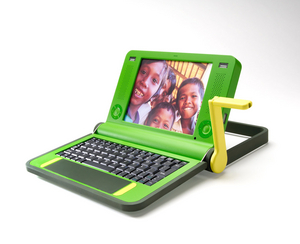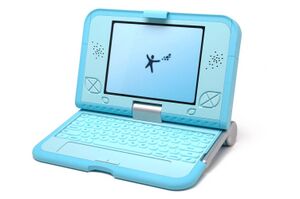Una Laptop por Niño: Difference between revisions
(Primer boceto de esta página....version 0.1 ultra-alfa :-P) |
m (→El Hardware) |
||
| Line 15: | Line 15: | ||
El portátil verde, diseñado por [http://www.dcontinuum.com/ Design Continuum], fue unveiled en el WSIS, Túnez por el secretario general de la ONU Kofi Annan y Nicholas Negroponte.[[Image:Laptop-crank.jpg|thumb|The Green Machine with crank]] |
El portátil verde, diseñado por [http://www.dcontinuum.com/ Design Continuum], fue unveiled en el WSIS, Túnez por el secretario general de la ONU Kofi Annan y Nicholas Negroponte.[[Image:Laptop-crank.jpg|thumb|The Green Machine with crank]] |
||
Fuse- |
Fuse-product ha desarrollado recientemente los prototipos: portátil azul y el portátil amarillo.[[Image:blue-front.jpg|thumb|The Blue Machine]] [[Image:yellow-ebook.jpg|thumb|The Yellow Machine]] |
||
Revision as of 19:31, 7 April 2006
Un portátil por niño
Un portátil por Niño (OLPC) es una nueva asociación sin fines de lucro dedicada a la investigación para desarrollar una laptop de 100 dólares (USD); una tecnología que podría revolucionar como educamos a los niños del mundo. Esta iniciativa fue anunciada inicialmente por Nicholas Negroponte, Presidente de OLPC, en el Foro Económico Mundial de Davos, Suiza en enero del 2005.
Nuestro objetivo: Proveer a los niños alrededor del mundo con nuevas oportunidades para explorar, experimentar y expresarse por sí mismos.
Note por favor que las laptops de 100 dólares (USD) - todavía no están en producción - no estarán disponibles para su venta. Las laptops sólo podrán ser distribuidas a las escuelas directamente y a través de grandes iniciativas gubernamentales.
Note that there is a comprehensive description of the project in the Wikipedia. As for this Wiki it's still small enough for the Special:Allpages link to be useful.
El Hardware
La máquina de 100 dólares (USD) propuesta, deberá estar basada en Linux, con una pantalla de modalidad dual mostrando ambos modos a todo color, modo de transmisivo DVD, y una opción de pantalla secundaria reflectiva en blanco y negro, legible a la luz del sol a una resolución 3x. La laptop tendrá un procesador de 500MHz y 128MB de memoria DRAM, con 500MB de memoria Flash; no tendrá unidad de disco duro, pero tendrá cuatro puertos USB. Las laptops tendrán conexión de red inalámbrica que, entre otras cosas, les permitirá conectarse entre sí (mesh network); cada laptop podrá comunicarse con su vecino más cercano, creando una red ad hoc, red de area local. Las laptops usarán fuentes de poder innovadoras (incluyendo manual) y podrán hacer la mayor parte de lo que hace una computadora a excepción de guardar grandes cantidades de información.
El portátil verde, diseñado por Design Continuum, fue unveiled en el WSIS, Túnez por el secretario general de la ONU Kofi Annan y Nicholas Negroponte.
Fuse-product ha desarrollado recientemente los prototipos: portátil azul y el portátil amarillo.
Se están mirando varias posibilidades energéticas con fuerza humana, como una manivela manual, un pulsador de pie y un sistema agitador. Nuestro objetivo es un mínimo de esfuerzo para suministrar energía para trabajar, por ejemplo, un minuto de accionar la manivela para 10 minutos de uso. Describiremos los detalles en cuanto los tengamos disponibles.
Nosotros estamos continuamente zeroing en las especificaciones técnicas para la primera generación de máquinas.
El software
Nosotros nos unimos al principio de Software Libre para este proyecto. Por favor lea nuestro manifiesto: OLPC en software libre We are committed to the principle of Open Source for this project. Please refer to our manifesto: OLPC on open source software.
Developing software for this machine is very straight forward, though there are development issues you should be aware of. Our partner in software development is Red Hat.
We have begun an OLPC software task list. Please help us refine this list.
Discussion of Instant Messaging Challenges lays a framework for thinking about the different challenges facing the use of instant messaging applications as they exist today on the $100 laptop. Those issues will need to be overcome if instant messaging is to be usable within the environments in which the $100 laptop will be deployed.
Discussion of eBook feature set is a page in which traditional and nontraditional features are discussed both in abstract and in relation to the different eBook readers out there.
Wiki as an ebook reader is where we discuss the suitability of wiki as an ebook distribution medium, and why it would help solve some of the other challenges that the $100 laptop is trying to address.
Educational content
OLPC is based on "constructionist" theories of learning pioneered by Seymour Papert and later Alan Kay, as well as the principles expressed in Nicholas Negroponte's book 'Being Digital'. Some background on our approach can be gleaned from David Cavallo's essay, "Models for growth—towards fundamental change in learning environments"
Launch plans
The laptops will be sold to governments and issued to children by schools on a basis of "one laptop per child." Initial discussions have been held with China, India, Brazil, Argentina, Egypt, Nigeria, and Thailand. In addition, a modest allocation of machines will be used to seed developer communities in a number of other countries. A commercial version of the machine will be explored in parallel.
There are a series of pages in this wiki dedicated to OLPC Thailand. Similar pages from other potential launch countries (OLPC Brasil, OLPC Argentina, OLPC Egypt, OLPC Greece, OLPC Nigeria, OLPC India, and OLPC China) will follow.
Getting involved
There is a page in this wiki dedicated to Getting involved in OLPC, an OLPC Idea Pool page, an IRC channel (irc.freenode.net, #OLPC), mailing lists for generic OLPC discussions not specific to any Linux distribution, and a Jobs at OLPC page.
There is a Fedora Project for OLPC, where you can get the Fedora software for the OLPC hardware and join Fedora OLPC related mailing lists.
FAQ
The official FAQ is on the project website, but please feel free to pose additional questions here: OLPC FAQ. There is also a collection of OLPC myths that has been accumulating.


